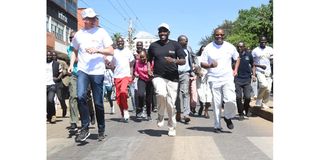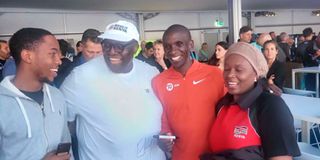Role of sport in diplomacy vital

From left: German Ambassador to Kenya Sebastian Groth, Uasin Gishu County Governor Jonathan Bii, Uasin Gishu County Chief of Staff Nicholas Chepkwony and other guests jog in Eldoret town street, Uasin Gishu County to converge for Berlin Marathon Viewing Street Party organised by Nation Media Group's NTV on a giant screen belonging to Uasin Gishu County government on September 24, 2023.
What you need to know:
- Kipchoge’s fifth victory in the German capital also triggered a fresh phase in the long-standing diplomatic relations between Kenya and Germany
- Amolo and Groth were in close contact ahead of the Berlin race, the latest conversations — centred around sport — further cementing the Germany-Kenya relationship
- Meanwhile, the Kenyan embassy in Japan held a fun-run on Sunday at Tokyo’s Rinkai Park to celebrate 60 years of diplomatic relations between Kenya and Japan
For the fifth time, Eliud Kipchoge caused the Kenyan national anthem to be played at the iconic Brandenburg Gate after winning Sunday’s Berlin Marathon.
Kipchoge’s fifth victory in the German capital also triggered a fresh phase in the long-standing diplomatic relations between Kenya and Germany.
Kenya’s ambassador to Germany, Thomas Amolo, was at the Brandenburg Gate finish line, strategically positioned to receive Kipchoge and celebrate another Kenyan win.

Kenya’s ambassador to Germany Thomas Amolo (in glasses) celebrates with Berlin marathon winner Eliud Kipchoge and Kenyan fans in berlin on September 24, 2023.
Meanwhile, his opposite number, Germany’s ambassador to Kenya Sebastian Groth, was in Eldoret following the 49th Berlin Marathon at a street carnival organised by the Nation Media Group through NTV’s live broadcast, and which was also attended by Uasin Gishu Governor Jonathan Bii.
60 years of independence
Amolo and Groth were in close contact ahead of the Berlin race, the latest conversations — centred around sport — further cementing the Germany-Kenya relationship that is particularly important considering that Germany was the first country to recognise an independent Kenya in 1963.
Meanwhile, the Kenyan embassy in Japan held a fun-run on Sunday at Tokyo’s Rinkai Park to celebrate 60 years of diplomatic relations between Kenya and Japan.
Kenya’s ambassador to Japan, Tabu Irina, was host while the Government of Japan was represented by Kazuhiro Yagi, Director in the International Affairs Division of the Japan Sports Agency. Irina highlighted sports as a key sector in Kenya’s development noting that within Kenya’s Foreign Policy, sports diplomacy is an integral component under the Cultural Diplomacy Pillar.
Participants of the fun-run included six Japan-based Kenyan elite runners, some Japanese elite runners, ambassadors, diplomats and members of the Kenyan diaspora.

Kenya’s ambassador to Japan Tabu Irina with Japan-based Kenyan athletes ahead of a fun run to celebrate 60 years of Kenya’s relations with Japan on September 24, 2023.
Elsewhere, on the sidelines of the United Nations General Assembly, President William Ruto signed a development partnership deal between Kenya and USA’s National Basketball Association (NBA) that is expected to spur the development of the game in Kenya through technical and infrastructural support.
Broadly-speaking, there’s need to aggressively harness such soft power of sport to foster international goodwill.
And there’s no better way to do this than utilise the positive influence of our world-beating athletes.
In fact, it ought to be a key deliverable at the Ministry of Foreign Affairs to have Kenyan diplomats in the out-stations engage with our athletes wherever they compete in their jurisdiction also as a way of honouring their contribution towards sewing together the national fabric.
Shared love of sports
In Australia, for instance, the Department of Foreign Affairs and Trade has a vibrant Sports Diplomacy Strategy that seeks “to bring people, communities, nations and regions together to help build security and prosperity through a shared love of sports.”
The US State Department also boasts a Sports Diplomacy division which has been key in tackling radicalisation, especially following the 9/11 attacks on New York and Washington.

From left: Uasin Gishu County Governor Jonathan Bii, German Ambassador Sebastian Groth, Eldoret Municipality Manager Tito Koiyet, John Kanyi, EKA HOTEL General Manager, and Uasin Gishu County Executive Committee for Sports Lucy Ngendo during unveiling of EKA’s Wall of Fame in EKA Hotel, Eldoret town of Uasin Gishu County, presided over Groth on September 24, 2023.
The “ping pong diplomacy” of 1972 was kicked off by interaction between US and Chinese table tennis players during the Cold War, leading to political reconciliation between the two nations, a classic example of the power of sport in international relations.
Mega sporting events can also be used for political reasons, as was the case in last year’s Fifa World Cup in Qatar that sought to give the positive side of the Doha leadership.
Makori is the Lead Editor (Sports and Integration Projects) at Nation Media Group.





